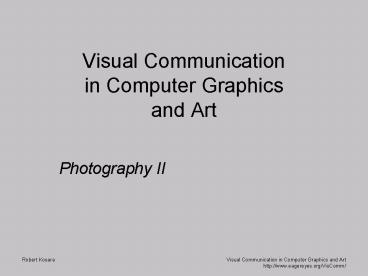Visual Communication in Computer Graphics and Art http:www'eagereyes'orgVisComm - PowerPoint PPT Presentation
1 / 26
Title:
Visual Communication in Computer Graphics and Art http:www'eagereyes'orgVisComm
Description:
David Bailly, Self-Portrait with Vanitas Symbols, 1651. Robert Kosara ... http://www.uni-bayreuth.de/ Light is changes. direction on the. interface between ... – PowerPoint PPT presentation
Number of Views:34
Avg rating:3.0/5.0
Title: Visual Communication in Computer Graphics and Art http:www'eagereyes'orgVisComm
1
Visual Communicationin Computer Graphicsand Art
- Photography II
2
Symbols in Painting
David Bailly, Self-Portrait with Vanitas Symbols,
1651
3
Baillys Self-Portrait
- Painted at 65
- Shows his current self in painting-in-painting
- Symbols
- Coins, pearl necklace, wine Fortune
- Skull Science
- Soap bubbles Transience
- Palette Painting
- Whole painting symbolizes transience, time, aging
4
Single/Twin Lens Reflex Cameras
- Single Lens Reflex, SLR
- Twin Lens Reflex, TLR
Viewfinder
Viewfinder
5
(Dis-)Advantages of SLRs
- Advantages
- Exact framing, no parallax
- Viewfinder image upright and not mirrored
- Can see sharpness, filter effects, etc.
- No inferior lens for viewfinder
- Disadvantages
- Inertia of mirror movement
- No image while picture is taken
- Dark viewfinder with some lenses
6
Focal Length and Perspective
- Focal length f determines the image angle ?
- Illustrated for pinhole camera
?
s
f
7
Focal Length/Format and Angle
Same length, Different format
Important especially for digital cameraswith
different sensor sizes.Reason for 35mm
equivalent
Same format, Different lenght
8
Focal Length/View Angle
- Wide Angle Lens
- 35mm format up to about 35mm
- Deep image
- Differences in size between close and distant
objects - Telephoto lens
- 35mm above 85mm
- Compressed image
- All objects have similar size
9
Fisheye Lens
- Very wide angle
- More magnification in center of image
http//video.antville.org
10
Refraction of Light
Light is changesdirection on theinterface
betweenmediums of differentoptical
density Different wavelengths are refracted
indifferent angles
http//www.uni-bayreuth.de/
11
Refraction of Light
a incident angle ß refractive angle c1
speed of light in medium 1 c2 speed of light in
medium 2
12
Lens Camera
- Lenses for better light sensitivity and more
creative control
Lens
Shutter
Aperture
Film
13
The Thin Lens Model
Focal Length f
Optical Axis
f
Lens plane
The Lens Equation
14
Shallow Depth of Field
David J. Nightingale, chromasia.com/iblog/
15
Shallow Depth of Field
John Washington, http//johnwashington.co.uk/
16
Aperture
D
f
- Numeric aperture k (the denominator in 1/5.6,
etc.) - Effective lens diameter D
- Focal length f
17
Aperture
- Part of the lens
- Shape of aperture
- Ideally round
- Really a (more or less) regular polygon
- Important for appearance of blurred regions
- Aperture blades
- Stopping down means closing aperture
18
Numeric Aperture
- Number that gives the ratio between effective
lens diameter and focal length - Does not describe the ratio of incoming/outgoing
light! - Each step means half/double the area, so aperture
numbers change with v2 1.411, 11.4, 12,
12.8, 14, 15.6, 18, 111, ...
19
Circle of Confusion
C
D
v
Solid line sharp imageDotted Line blurred
image
v
20
What is Sharpness?
- Every point is depicted as small disc
- Image appears sharp if circle of confusion small
enough to be seen as point - For 35mm and typical enlargements, a diameter of
less than 0.03mm gives a sharp image
21
Circle of Confusion
- In practice mostly a polygon
- Aperture blades rounded
- Diffraction occurs at corners where aperture
blades meet - Aperture designed so blades meet at obtuse angle
22
Diffraction at Aperture
23
Bokeh
- The quality of blurred regions of the image
- Japanese Word
- Relatively subtle in most images
- Criterion for lens quality
http//wvs.topleftpixel.com/
24
Sieve Aperture
Heinrich Tauscher
25
Mirror Lens
- Aperture has doughnutshape
26
Mirror Lens Bokeh































